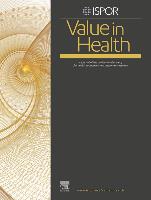A Report of a Joint HTAi/ISPOR Task Force
 Lawrenceville, NJ, USA—June 7, 2022—Value in Health, the official journal of ISPOR—The Professional Society for Health Economics and Outcomes Research, announced today the publication of guidance regarding the establishment or improvement of deliberative processes for health technology assessment (HTA). The report, “Designing and Implementing Deliberative Processes for Health Technology Assessment: A Good Practices Report of a Joint HTAi/ISPOR Task Force,” will be copublished in June 2022 in the International Journal of Technology Assessment in Health Care and Value in Health.
Lawrenceville, NJ, USA—June 7, 2022—Value in Health, the official journal of ISPOR—The Professional Society for Health Economics and Outcomes Research, announced today the publication of guidance regarding the establishment or improvement of deliberative processes for health technology assessment (HTA). The report, “Designing and Implementing Deliberative Processes for Health Technology Assessment: A Good Practices Report of a Joint HTAi/ISPOR Task Force,” will be copublished in June 2022 in the International Journal of Technology Assessment in Health Care and Value in Health.
“There has been a lack of clear consensus on what constitutes ‘deliberation’ or ‘deliberative processes’ from a comprehensive HTA perspective,” said lead author Wija Oortwijn, MSc, PhD, Radboud University Medical Center, Nijmegen, The Netherlands. “This lack of guidance has created the need for consensus international good practices. As part of its mission to improve decision making for health globally, ISPOR is collaborating with HTAi, another global, nonprofit, scientific and professional society with HTA expertise and experience to address this gap in global decision making. Together, these organizations formed the Joint HTAi/ISPOR Deliberative Processes for HTA Task Force.”
Because there has previously been no widely recognized definition of a “deliberative” process for HTA, the first goal of the Task Force was to develop the following definitions:
Deliberation in HTA is the informed and critical examination of an issue and the weighing of arguments and evidence to guide a subsequent decision.
A deliberative process for HTA consists of procedures, activities, and events that support deliberation in HTA.
The report goes on to provide guidance and an accompanying checklist for (1) developing the governance and structure of an HTA program, and (2) informing how the various stages of an HTA process might be managed using deliberation. The guidance and the checklist contain a series of questions grouped by 6 phases of a model deliberative process:
Phase I. Determining the need for a deliberative process
Phase II. Preparing for a deliberative process
Phase III. Conducting a deliberative process
Phase IV. Supporting a deliberate process
Phase V. Development and communication of the outputs of deliberation
Phase VI. Monitoring and evaluation
Answers to the questions within each phase represent a minimum set of considerations and design features that are required in order to qualify a process as deliberative. The checklist is not intended as a scoring rubric but rather allows users to more readily scrutinize whether improvements can be made. The guidance and checklist are offered as practical tools for those wishing to establish or improve deliberative processes for HTA that are fit for local contexts. The tools can also be used for independent scrutiny of deliberative processes.
“Because deliberative processes for HTA are rarely seen in actual operation, we encourage colleagues that use the guidance and checklist—or have recently implemented a deliberative process—to share their experiences with us,” said Dr Oortwijn. “We will use this information to further optimize the guidance and accompanying checklist and to inform future activities of the Task Force.”
###
ABOUT HTAi
Health Technology Assessment international (HTAi) is the global, nonprofit, scientific, and professional society for all those who produce, use or encounter health technology assessment (HTA). HTAi represents 82 organizations and over 2500 individual members from 65 countries around the world. HTAi is a member-driven organization, representing a variety of stakeholders who have interests in HTA. These stakeholders include researchers, policy makers, industry, academia, health service providers, agencies, and patients, and they contribute to balanced conversation around HTA across different areas of practice and jurisdictions.
Website | Twitter | Facebook | YouTube | Instagram
ABOUT ISPOR
ISPOR, the professional society for health economics and outcomes research (HEOR), is an international, multistakeholder, nonprofit dedicated to advancing HEOR excellence to improve decision making for health globally. The Society is the leading source for scientific conferences, peer-reviewed and MEDLINE®-indexed publications, good practices guidance, education, collaboration, and tools/resources in the field.
Website | LinkedIn | Twitter (@ispororg) | YouTube | Facebook | Instagram
ABOUT VALUE IN HEALTH
Value in Health (ISSN 1098-3015) is an international, indexed journal that publishes original research and health policy articles that advance the field of health economics and outcomes research to help healthcare leaders make evidence-based decisions. The journal’s latest impact factor score is 5.725 and its 5-year impact factor score is 6.932. Value in Health is ranked 4th of 98 journals in health policy and services, 9th of 108 journals in healthcare sciences and services, and 24th of 376 journals in economics. Value in Health is a monthly publication that circulates to more than 10,000 readers around the world.
Website | Twitter (@isporjournals)
ABOUT ISPOR GOOD PRACTICES REPORTS
ISPOR has earned an international reputation for research excellence based, in part, on its Good Practices Reports. These highly cited reports are expert consensus recommendations on good practice standards for outcomes research (clinical, economic, and patient-reported outcomes) and on the use of this research in healthcare decision making. ISPOR Task Forces comprise subject matter experts representing different stakeholders from diverse work environments (ie, regulators, payers, manufacturers, technology assessors, etc from research, government, academic, and industry sectors around the world). All ISPOR Good Practices Reports are published in the Society’s scientific journal, Value in Health, and are made freely available as part of the Society’s mission. The Society’s Good Practices Reports have been recognized with an ASAE “Power of A” award that acknowledges innovative, effective, and broad-reaching programs that have a positive impact on the world.